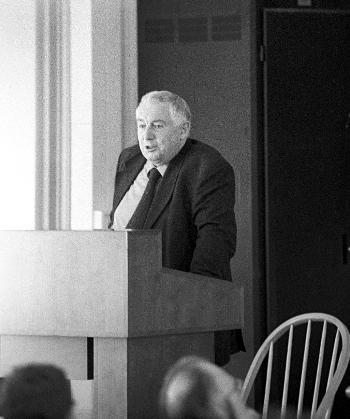
JONATHAN GLOVER, professor of ethics at Kings College, London, delivers the 2002 Frederick Atherton Lecture yesterday in Harvard Hall. Glover proposed a world-wide policing organization to stem conflict.
British ethics professor Jonathan Glover proposed the establishment of an effective global “policing” organization during his presentation of the 2002 Frederick Atherton Lecture yesterday afternoon in Harvard Hall.
Glover, who is professor of ethics and director of the Centre of Medical Law and Ethics at King’s College, London, suggested that low esteem can foment violent impulses both among groups that are oppressed and groups that act as oppressors.
Applying his conclusions to global violence, he said that a single organization devoted to quelling worldwide conflict would ultimately improve political stability between nations. Glover cited present organizations devoted to maintaining worldwide peace, such as the United Nations, as insufficiently effective.
His research, he said, suggests that actions intended as punishment or retribution between nations could alone breed future conflict.
Even national action which seems morally and politically justified, Glover said, might engender enmity.
“There is a possibility that whenever your country or mine bombs a country, we are sowing the seeds of the next generation of terrorists,” he said.
“I am not saying that we must never, without absolute authority, invade another country,” he added. “But we must be extraordinarily careful.”
The establishment of a global authority, Glover said, would help to quell the danger of sustaining violent vendettas.
The creation of such an organization would not be as implausible as one might suppose, according to Glover.
“People will support it because they believe that the alternative is worse,” he said. “I hope that this will come about without the alternative, because I believe that the alternative would be truly awful.”
Glover’s entire 55-minute lecture centered on the relationship between respect for human dignity and violence.
Referencing historical examples, such as British imperial rule in India and public humiliation during the Chinese communist revolution, he said that oppressors can more easily commit violence against people whom they habitually degrade.
Conversely, he said, people who receive little respect, particularly in childhood, often commit violent acts to attain recognition.
Glover received his academic training in ethics, spending thirty years at the University of Oxford before taking his present position at King’s College. He has written several books in the subject, including Humanity: A Moral History of the Twentieth Century.
He has also incorporated psychological research into his recent studies. He interviewed several patients in a high-security psychiatric hospital and found that many of them volunteered stories of childhood trauma.
Read more in News
Students Serve Up Pizza, Advice












